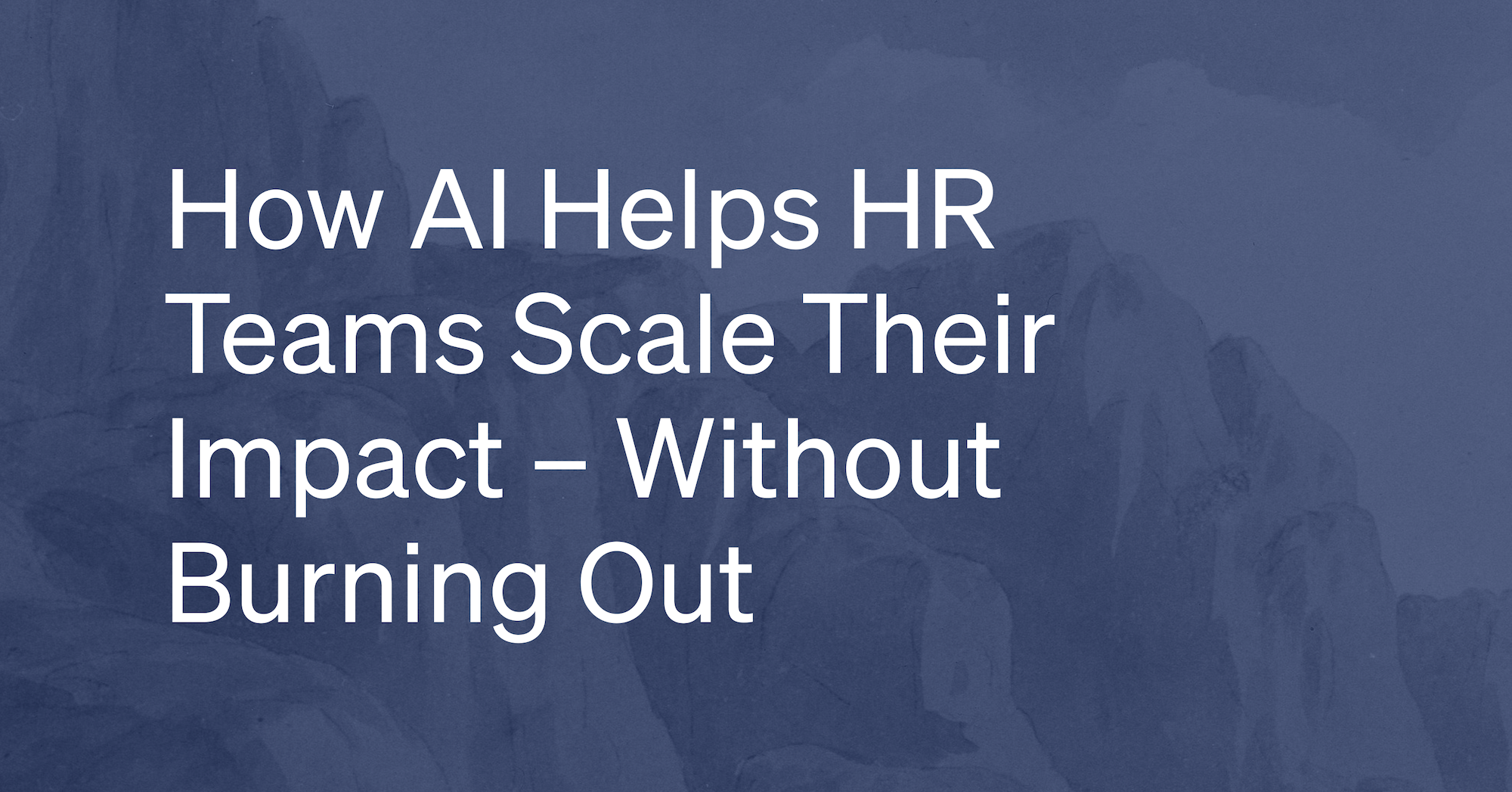The Human Element
How AI Helps HR Teams Scale Their Impact – Without Burning Out
HR teams are being asked to do more with less—and burnout is at a breaking point. Here’s how AI can help HR scale its impact without sacrificing well-being.

Your company is growing rapidly—so are the emails, onboarding sessions, and employee requests flooding your HR team. You're busier than ever, yet adding more HR staff isn't in the cards. It's the great paradox facing HR today: expanded responsibility without expanded capacity. Burnout is far from just a buzzword—it's a crisis.
According to Sage's HR research report, 95% of HR leaders say their workload is overwhelming, and 81% feel burnout.
Burnout doesn't just hurt morale—it slows down hiring, derails onboarding, and diminishes HR's strategic influence. But there's good news: AI is ready to step in as a teammate, taking tasks off your team's plate and helping HR scale without amplifying stress.
Why Scaling Teams the Traditional Way Risks Burnout
As your organization grows, HR's workload scales disproportionately, often outpacing available headcount and resources. In the Sage report, nearly 90% of HR leaders cite limited resources and budget as a top challenge. The workload piles up, with HR professionals spending excessive time on manual tasks—answering routine questions, managing repetitive processes, and juggling countless administrative duties.
Consider this common scenario: Your five-person HR team handles onboarding, benefits administration, leave requests, and employee engagement initiatives. As your org's employee count doubles, so does their workload. Each repetitive query about PTO policies or benefits enrollment chips away at your team's capacity, forcing them into overtime or multitasking—a recipe for burnout and mistakes.
The real-world consequence? HR professionals become overwhelmed, errors in critical people processes increase, and your HR function risks being pigeonholed as purely administrative, rather than strategically influential. This is how burnout contributes directly to keeping HR teams from focusing on what truly matters: shaping workplace culture and driving employee growth.
A New Approach: AI as an HR Teammate
Now imagine an HR team member who works tirelessly, around the clock, handling repetitive tasks flawlessly every time. That's exactly what an AI teammate like Harper can offer.
This is a fundamental shift in the HR operating model—one that emphasizes human impact over transactional grind.
Tasks AI Can Handle
An AI teammate can shoulder many common HR tasks, including:
- Answering common employee questions. Agents like Harper efficiently handle FAQs on leave policies, benefits, IT access issues, and more, dramatically reducing your HR team's inbox load.
- Managing routine processes. Leave requests, expense approvals, and interview scheduling become streamlined and automatic. AI-driven processes mean fewer missed details, less manual intervention, and more time savings.
- Analyzing HR data for insights. AI rapidly identifies patterns from employee feedback surveys and other data sources. It can help your HR function predict turnover risk, project costs, plan headcount needs, and other tasks that would typically overwhelm smaller teams.
There's much more AI can do, but here's the bottom line: By offloading these tasks, your human HR staff gains invaluable capacity to invest their energy in impactful, human-centric work. AI, in my view, gives them the freedom to focus on what really matters: shaping culture, workforce planning, employee development, and beyond.
How AI Prevents Burnout While Scaling
Leveraging AI offers tangible benefits that directly address burnout. Come of these include:
- Efficiency without exhaustion. AI tackles high-volume, routine tasks effortlessly, allowing your HR team to handle greater volumes of work without longer hours.
- Improved accuracy and consistency. Unlike humans, AI doesn't get tired. It delivers accurate, consistent results around the clock, significantly reducing errors and last-minute firefighting.
- Supporting your teams' well-being. By shouldering repetitive admin tasks, AI helps reduce daily stressors for HR professionals, which can not only reduce burnout, but improve overall well-being.
- Scaling personalized attention. Counterintuitively, integrating AI into HR allows for more personalized, human-centric interactions. When routine tasks are covered, HR professionals have the time and capacity to invest more deeply in complex employee relations, strategic planning, and career development.
A New Era of Scaled, Healthy HR
Agentic AI is a powerful new technology HR can use to scale service delivery without scaling burnout alongside. By allowing AI to manage the heavy lifting, HR leaders can multiply their impact while dividing their stress. An HR team of five can now confidently support a larger, scaling organization, not by sacrificing themselves, but by working smarter with AI by their side.
The voice for HR leaders now is not whether to scale—it's how. By adopting a people-first, AI-powered approach, you equip your leaders and workforce to thrive together. Your team deserves more than a workaround. AI is the upgrade HR has been waiting for.
Related






